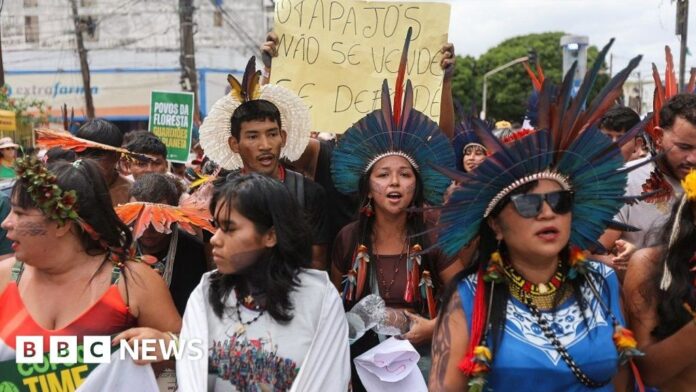Thousands of climate activists marched outside the COP30 summit in Belém, Brazil, demanding urgent action and protesting the continued reliance on fossil fuels. The demonstrations, the first permitted outside a UN climate conference since 2021, highlighted growing frustration with slow progress and perceived hypocrisy surrounding the talks.
Global Pressure on Negotiations
The protests included striking imagery: demonstrators carried mock coffins representing oil, coal, and gas, flanked by grim reapers, while indigenous groups displayed signs reading “the answer is us.” The presence of inflatable elephants and anacondas underscored the Amazon rainforest’s vulnerability, a key focus of the summit hosted by Brazil. Activists from across the globe joined Brazilian youth and indigenous communities, calling for an end to fossil fuel dependence.
Indigenous Voices and Land Rights
Indigenous groups emphasized the critical role they play in protecting biodiversity and forests, demanding legal ownership of their territories. The protests underscore a long-standing demand for recognition of indigenous land rights as essential to climate solutions. Many indigenous leaders express skepticism that their concerns over deforestation, resource extraction, and land protection are being adequately addressed within the COP30 negotiations.
Fossil Fuel Industry Presence Raises Concerns
Analysis by the coalition Kick Big Polluters Out (KBPO) revealed a record number of delegates from fossil fuel companies attending the summit, raising questions about industry influence over climate policy. This presence contrasts sharply with the stated goals of the conference: to accelerate the transition away from planet-warming fossil fuels.
Security Incidents and Ongoing Tensions
Security was tight at the COP30 venue, with police deploying riot shields to guard the entrance. Earlier in the week, protesters breached security lines, causing minor injuries and damage. The incident underscores the escalating tensions between activists and authorities as negotiations continue.
Limited Progress and Government Contradictions
Despite President Lula da Silva’s choice of Belém to spotlight the Amazon, his government recently approved oil exploration at the mouth of the river. This move, alongside the record industry presence, fuels skepticism among activists about genuine commitment to climate action. Negotiations have yielded limited progress in the first week, with delegations struggling to agree on a strategy to deliver on past promises.
The protests at COP30 reflect a growing global movement demanding urgent, meaningful action on climate change, while questioning the influence of fossil fuel interests and the sincerity of government commitments.






























